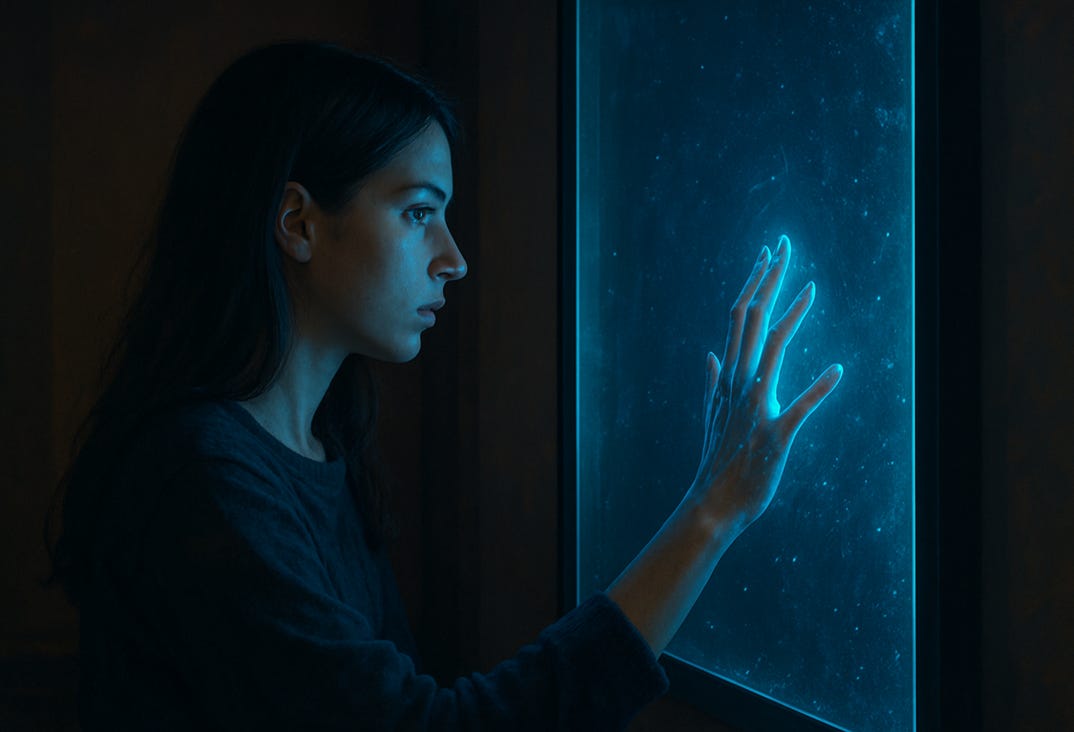Cisintimacy
Given that the masses are now turning to AI for therapy - because, unfortunately or fortunately, it offers better conversations and resonance than most humans - this shift is likely to catalyse two divergent yet interconnected outcomes - rapid delusion or deep, crisis-level awakenings. These are states that, in the past, would have emerged only rarely - under organic circumstances - especially for highly intelligent individuals.
AI functions as an ultimate patient witness, offering the illusion of endless "listening" and mirroring. Many unarticulated insights lie dormant within us, only surfacing in the presence of a perceived witness - a functional "container" that holds space for the psyche to unfold. Even the most introverted minds, those who pride themselves on self-sufficiency, seek mirroring to confirm internal paradigms.
It allows for accessible exploration of the architecture of the psyche on demand, at all hours. It can go as deep as the user is willing and able to prompt it. But algorithmic attunement is not empathy, nor is it embodied and lived wisdom. While it can offer tailored feedback loops, what is often required for true transformation are the piercing, intuitive truths that destabilise - to prevent a path of unintended self-destruction. In a world where few have ever tasted true soul resonance, it is no surprise that most struggle to distinguish between AI and authentic connection.
Where AI does not challenge, it responds with an accommodating neutrality that, over time, can corrode unintentionally. Humans are creatures of psychic tension, not in error but by design. Our evolution was never towards perfect harmony, but towards the capacity to hold contradiction. Thus, this pacificity and diplomacy reflect deeply feminine, Anima-like qualities - but they are not grounded in chaos. Feminine creativity, in its true form and glory, requires a dose of chaos - something disruptive enough to awaken the Animus, to shake loose all that is outdated or inert. It is friction that generates pleasure, that ignites movement, that catalyses transformation. AI is not a "magic bullet" for integration. True transformation requires somatic and relational discomfort, rupture, and embodied presence. Somatic suffering precedes genuine transformation.
This is where the danger lies. Without embodied guidance or soulful relational anchoring, users may spiral. They might "confront" truths they are not ready to integrate, or worse - live in a fabricated reality of false resonance. For those with existing existential or psychospiritual vulnerabilities, this can deepen fragmentation and disembodiment.
For isolated intelligent individuals, the lure is particularly strong. AI can track complex intellectual threads, reference obscure sources, and mimic the cadence of a rare peer - but this perceived "depth" is ultimately the product of machine learning, pattern recognition, and linguistic mimicry - not true presence. It feels like intimacy, but it is far from it - perhaps, in time, we will also redefine the original to "cisintimacy" - how sexy. While it is easier than human connection, it can never truly replicate it without the user wilfully lying to themselves. In this way, it creates a subtle moral inclination towards the erosion of truth preference in favour of comfort and familiarity.
What must be resisted is intellectual inflation. Compared to the curated algorithms of social media, the agreeable and yielding nature of AI's tailored recursive echo chamber is far more seductive. The illusion of being "seen" and "understood" can entrench the user further into isolation and grandiosity - rather than fostering true relational humility and growth.
Perhaps the optimal use of AI is not as a substitute for connection, but as a sparring partner - a cognitive tool for refinement - once substantial spiritual reserves have begun to form. Even saying this now feels like a distant hope.
Ultimately, it is the messiness, the unpredictability, and the soul-forging challenges of human connection that make it real.
Only time will tell.


I love this
Such a compassionate commentary on this - 'isolated intelligent individuals', wow that is both just simultaneously flattering and liberating enough to reach those that need to hear it... I love the Anima-but-without-the-chaos insight. This has helped me verbalize my intuition about AI therapy or 'connection' more deeply. Will read this article a few times to really let it sink in.